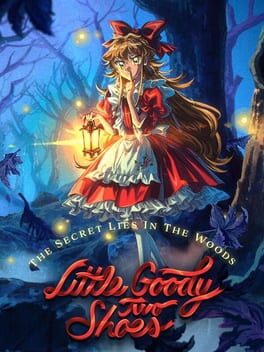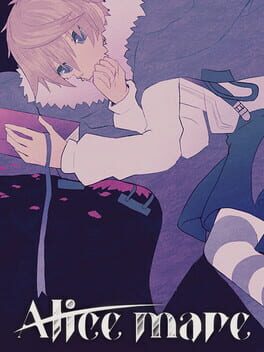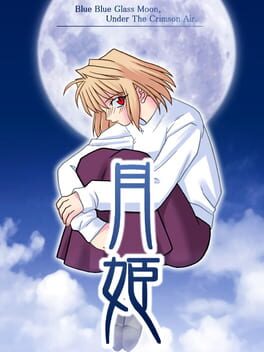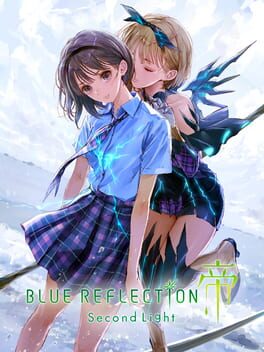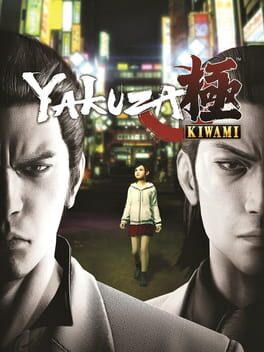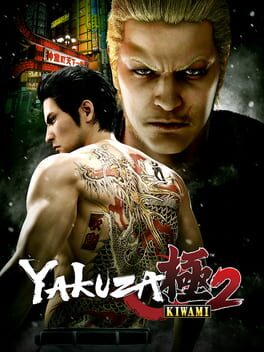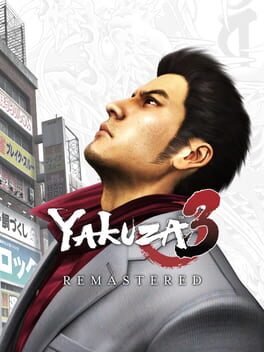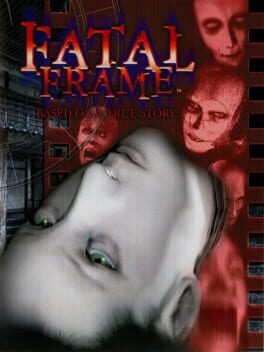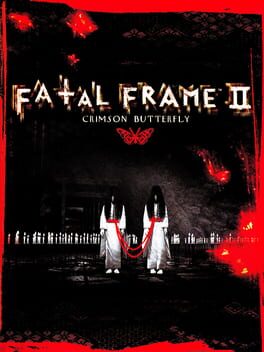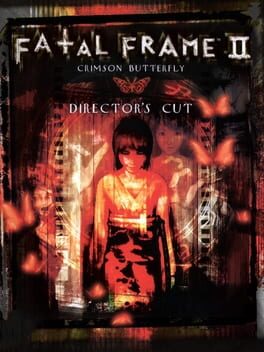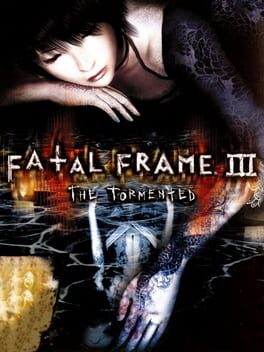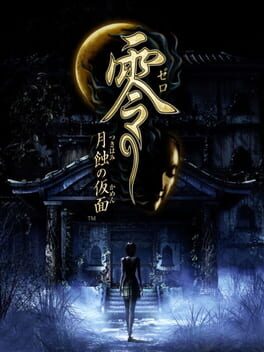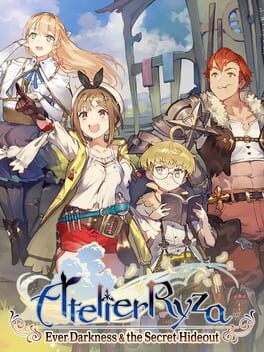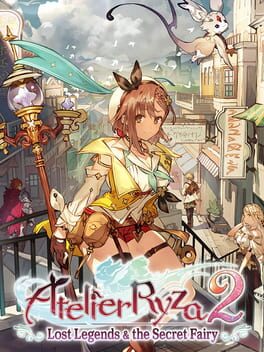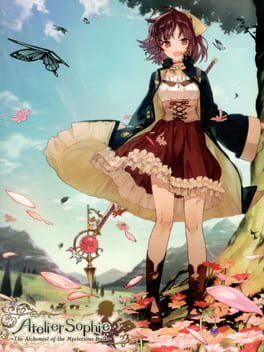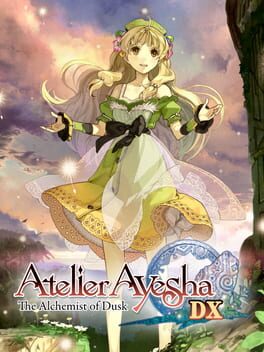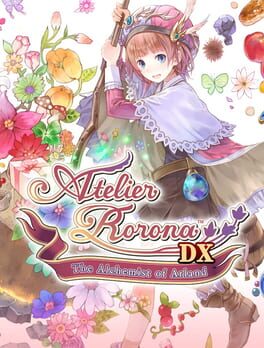37 reviews liked by 0lamper
Alicemare
2013
Final Fantasy X
2001
Tsukihime
2000
this is gust's best game since atelier shallie/the atelier dusk trilogy in general and that completely took me by surprise. the original blue reflection is what i would call a (perhaps more than) slightly perverted edm album with boss fights - hayato asano, who returns to score second light, provided an absolute rave of a backdrop to the few spectacular battles but everything else about the game had this uncomfortable sense of voyeurism barely holding together an rpg with many pointless systems and no budget to make sense of any of it. based on my experience with another of gust's sequels - nights of azure 2 - and the general trend in the kind of audiences they have been more obviously courting (stares despairingly at atelier ryza which i have not played yet due to oozing reddit aura) since about 2017 or so i had no hopes for this game and had written it off. a day before its release i had an epiphany that if i dont buy a physical copy now i would never be able to. so i did.
not only does it tone down the leery undercurrents of the original game, limiting more """fanservice""" (god i hate this term) elements to the DLC costumes that i'll happily look away from if it keeps the actual game not-cringe, it produces a kind of jrpg that simply doesnt exist anymore - one where characters have relationships with other characters who arent the protagonist! this is partially due to it having its own original cast, the cast of the 2017 game, the BR Ray anime and the BR Sun (as of yet unreleased) mobile game all present but they are all so well integrated into the narrative - a genuinely well written science fantasy mystery underpinned by the usual jrpg themes of friendship, love, self-actualisation - that it never feels like the annoying crossover episode it should feel like.
the most genuine pleasant surprise of all? a lesbian romance that is celebrated and proves central to the narrative, not fetishised even to the extent that it is in the original nights of azure - which i still commend for staying true to itself and acknowledging itself as a gay romance unlike the obnoxiously fetishising and pandering nonsense of nights of azure 2.
the battle system is fantastic, so in love with "ether per second" as a statistic that exists - extremely fun to say. but like most gust games the difficulty just isnt there to warrant engaging with the systems too much on the normal difficulty and you only unlock hard after your first playthrough. there is a bonus ending to achieve on new game plus so there is incentive there so i may return at some point. the auxiliary systems that exist - the social mechanics, the school building aspect all serve their functions but it isnt anything unseen before.
if you have ever been a fan of gust's output you will absolutely love this. its their best work in close to a decade and im glad its free from the worst elements i was saddened to see them approach on the whole. but fuck mel kishida for doing NFTs
not only does it tone down the leery undercurrents of the original game, limiting more """fanservice""" (god i hate this term) elements to the DLC costumes that i'll happily look away from if it keeps the actual game not-cringe, it produces a kind of jrpg that simply doesnt exist anymore - one where characters have relationships with other characters who arent the protagonist! this is partially due to it having its own original cast, the cast of the 2017 game, the BR Ray anime and the BR Sun (as of yet unreleased) mobile game all present but they are all so well integrated into the narrative - a genuinely well written science fantasy mystery underpinned by the usual jrpg themes of friendship, love, self-actualisation - that it never feels like the annoying crossover episode it should feel like.
the most genuine pleasant surprise of all? a lesbian romance that is celebrated and proves central to the narrative, not fetishised even to the extent that it is in the original nights of azure - which i still commend for staying true to itself and acknowledging itself as a gay romance unlike the obnoxiously fetishising and pandering nonsense of nights of azure 2.
the battle system is fantastic, so in love with "ether per second" as a statistic that exists - extremely fun to say. but like most gust games the difficulty just isnt there to warrant engaging with the systems too much on the normal difficulty and you only unlock hard after your first playthrough. there is a bonus ending to achieve on new game plus so there is incentive there so i may return at some point. the auxiliary systems that exist - the social mechanics, the school building aspect all serve their functions but it isnt anything unseen before.
if you have ever been a fan of gust's output you will absolutely love this. its their best work in close to a decade and im glad its free from the worst elements i was saddened to see them approach on the whole. but fuck mel kishida for doing NFTs
Drakengard
2003
this game requires no introduction anymore so i'm not beating around the bush. drakengard has been on my mind a fair bit recently - on the off chance you'll forgive a second log i think it's worth examining some of what the title accomplishes uniquely well, or what it's able to achieve with respect to the various titles that it's in conversation with. first of all: there's nothing quite as flatline-inducing or revealing of the author's own tendencies as reading that drakengard was intentionally poorly designed, a commonly held idea in various hobbyist communities frustratingly stemming just as often from its supporters as from its detractors. not only is this a frightfully pedantic and dull reduction of the text - it's also just an elaborately constructed fiction masking deeper truths. for instance, i think it's plain as day our burgeoning critical language still struggles with titles seemingly antithetical to traditional enjoyment, and are only able to escape from suffocating evaluative lexicon through irony or genre labels. survival horror isn't normally 'fun' & people appear willing to understand this so the genre gets a normative pass en masse, although it seems worth mentioning that the longer they exist in the public eye the more their mechanical frameworks get totally demystified by the public, arguably reducing them to vehicles for pleasure and gratification anyways, resident evil being the prime example.
drakengard, of course, isn't survival horror. it's largely a musou with some horror trappings, but it's rather plain about its affectation. however, because the traditional 'game' part of it is in such conflict with its aesthetic, we end up with the idea that this dissonance is a result of intentionally languid, engineered dissatisfaction. oh wow that wacky yoko taro wanted you to feel bad so he made his debut game bad. bzzzzt. wrong. square enix wanted a commercial success with drakengard. if they didn't, they wouldn't have requested that a project starting out as a simple remix of ace combat (owing massive inspiration to electrosphere in particular, another game that combines peerless arcade bluster with bleak narrative proceedings) would incorporate elements of its contemporary blockbuster peer, dynasty warriors. none of this is to say that drakengard can't be an awkward game, but it's in large part due to a friction with cavia's inexperience/lack of technical expertise, their attempts at holding true to their initial vision for the project, and square enix being desperate for a worthy competitor to koei tecmo's success.
here's where i'll stake a claim on something potentially contentious and risible. on the basis of the title's struggles in production & development, it is somewhat shocking that drakengard is not just 'not bad', but is a totally competent musou game. given the milieu in which it released, you might even dare to call it 'good', or 'well-made'. i'll double down with something absolutely no one wants to hear: most people have no point of reference because musou is rarely put in its historic context, appreciated for its strengths, or even, broadly speaking, played. disregarding popular experimental offshoot licensed games which carry their own unique magnetism, dynasty warriors has an especially prevalent stigma in contemporary action game circles, and few seem willing to return to reevaluate the franchise. if we accept this as the case, we can begin to understand why nostalgia is the primary driver of fondness for early musou, and why you always hear dynasty warriors 3 is the best one. 'load of bull', you say, 'drakengard is not good', you say, 'dynasty warriors sold millions and is beloved for inventing the drama; surely it's better', you say, but take a look at these admittedly small sample sizes (evidence A and evidence B) and you tell me which is actually the niche ip at present. one of these broader game worlds got a FFXIV collaboration. it was not dynasty warriors.
anyways the idea that drakengard could be a respected peer to dynasty warriors - or even, perhaps, better - is not ahistorical. drakengard came out in 2003, only a few months after the release of dynasty warriors 4. by this point in the dynasty warriors timeline, your only sources of inspiration for the musou canon are dynasty warrior 2 and dynasty warriors 3. they're fine games for what they are - content-rich, pop recontextualizations of romance of the three kingdoms that fold the intense political drama, grandiose character dynamics, and poeticizing of feudal history intrinsic to the novel and morphs them into larger-than-life battles of one against one hundred. it works for that series, but having played dynasty warriors 3, it's also very simply orchestrated. DW3 is kinetic and energetic, sure, but form is not function. as a still nascent series, DW3 has yet to experiment with elements that would come to define later entries, such as a strong emphasis on field management - its presence in 3 is largely muted and, dependent upon your stats, can often be negated. it is mostly a game of fulfilling your objectives, grinding up your stats, and engaging in undemanding combat pulling the same strong combo strings against some unique generals and a multitude of carbon copy generic ones. and i happen to appreciate it for what it is, but there is no question in my mind if you slotted that exact same mechanical framework into drakengard's tone and setting, it would be similarly deemed bad on purpose.
other than its tone what does drakengard do differently from this purely mechanical perspective? honestly, not too much from DW3! archers are still often priority targets, because if you don't prioritize them you will get knocked off yourhorse dragon. mission structure is usually quite similar, arguably with a bit less back and forth. combos require virtually the exact same input. the camera in both games is kind of fucked up. aside from abstruse unlock requirements and a...unique, system of progression, the biggest differences are mostly relegated to additions rather than subtractions. there are more enemy designs than just grunt soldiers. you can dodge now. the game is weapon-driven rather than character-driven ala DW3, which allows for its own form of unique experimentation. the soundtrack is excellent, i'm not accepting complaints. to aid in breaking up the pace, there are aerial missions that play somewhat comparably to panzer dragoon on-rail segments which are actually quite fun; likewise, the hybrid missions allow for angelus to be used as a means of offence in ground warfare and rain hellfire from above. it keeps things relatively varied. there's no troops to manage because caim is fighting a losing war and willingly formed a pact with the only being capable of potentially turning the tides, and the game is content to use the musou form to communicate ideas about caim and angelus to great effect.
of course, it's the narrative which gives drakengard a lot of its greatest texture (and is also demonstrative of its greatest strengths and appeals as a DW clone), but we can save discussion of that for some other time; for now it's more important for me to say that it's not quite the outright condemnation of violence through ludology that so many claim it is (it's far more interested in more subtle forms of violence than the explicit and ceaseless murder it depicts anyways). really, this was just a self-indulgent exercise in placing drakengard in its historic context once and for all, away from all the retrospectives it's been getting as a result of nier's runaway success. drakengard is a game that won't be for most, but it's a game that's lingered in my memory long since i first played it. it takes an, at the time, relatively new genre, and through sheer passion and dedication spins it into a uniquely transgressive idea while still remaining an enjoyable title to let unfold. if it feels numbing or meditative, that's more or less the exact emotional resonance that something like DW3 is targeting - drakengard just uses it to achieve more things than a sense of gratifying white noise. it remains peerless because of all of its contradictions, because of how messy and thorny it is as a game, and because we'll never see anything approaching this utterly unique interplay of emotional rhythms and macabre, uncanny storytelling wearing the skin of its crowdpleasing predecessors ever again.
drakengard, of course, isn't survival horror. it's largely a musou with some horror trappings, but it's rather plain about its affectation. however, because the traditional 'game' part of it is in such conflict with its aesthetic, we end up with the idea that this dissonance is a result of intentionally languid, engineered dissatisfaction. oh wow that wacky yoko taro wanted you to feel bad so he made his debut game bad. bzzzzt. wrong. square enix wanted a commercial success with drakengard. if they didn't, they wouldn't have requested that a project starting out as a simple remix of ace combat (owing massive inspiration to electrosphere in particular, another game that combines peerless arcade bluster with bleak narrative proceedings) would incorporate elements of its contemporary blockbuster peer, dynasty warriors. none of this is to say that drakengard can't be an awkward game, but it's in large part due to a friction with cavia's inexperience/lack of technical expertise, their attempts at holding true to their initial vision for the project, and square enix being desperate for a worthy competitor to koei tecmo's success.
here's where i'll stake a claim on something potentially contentious and risible. on the basis of the title's struggles in production & development, it is somewhat shocking that drakengard is not just 'not bad', but is a totally competent musou game. given the milieu in which it released, you might even dare to call it 'good', or 'well-made'. i'll double down with something absolutely no one wants to hear: most people have no point of reference because musou is rarely put in its historic context, appreciated for its strengths, or even, broadly speaking, played. disregarding popular experimental offshoot licensed games which carry their own unique magnetism, dynasty warriors has an especially prevalent stigma in contemporary action game circles, and few seem willing to return to reevaluate the franchise. if we accept this as the case, we can begin to understand why nostalgia is the primary driver of fondness for early musou, and why you always hear dynasty warriors 3 is the best one. 'load of bull', you say, 'drakengard is not good', you say, 'dynasty warriors sold millions and is beloved for inventing the drama; surely it's better', you say, but take a look at these admittedly small sample sizes (evidence A and evidence B) and you tell me which is actually the niche ip at present. one of these broader game worlds got a FFXIV collaboration. it was not dynasty warriors.
anyways the idea that drakengard could be a respected peer to dynasty warriors - or even, perhaps, better - is not ahistorical. drakengard came out in 2003, only a few months after the release of dynasty warriors 4. by this point in the dynasty warriors timeline, your only sources of inspiration for the musou canon are dynasty warrior 2 and dynasty warriors 3. they're fine games for what they are - content-rich, pop recontextualizations of romance of the three kingdoms that fold the intense political drama, grandiose character dynamics, and poeticizing of feudal history intrinsic to the novel and morphs them into larger-than-life battles of one against one hundred. it works for that series, but having played dynasty warriors 3, it's also very simply orchestrated. DW3 is kinetic and energetic, sure, but form is not function. as a still nascent series, DW3 has yet to experiment with elements that would come to define later entries, such as a strong emphasis on field management - its presence in 3 is largely muted and, dependent upon your stats, can often be negated. it is mostly a game of fulfilling your objectives, grinding up your stats, and engaging in undemanding combat pulling the same strong combo strings against some unique generals and a multitude of carbon copy generic ones. and i happen to appreciate it for what it is, but there is no question in my mind if you slotted that exact same mechanical framework into drakengard's tone and setting, it would be similarly deemed bad on purpose.
other than its tone what does drakengard do differently from this purely mechanical perspective? honestly, not too much from DW3! archers are still often priority targets, because if you don't prioritize them you will get knocked off your
of course, it's the narrative which gives drakengard a lot of its greatest texture (and is also demonstrative of its greatest strengths and appeals as a DW clone), but we can save discussion of that for some other time; for now it's more important for me to say that it's not quite the outright condemnation of violence through ludology that so many claim it is (it's far more interested in more subtle forms of violence than the explicit and ceaseless murder it depicts anyways). really, this was just a self-indulgent exercise in placing drakengard in its historic context once and for all, away from all the retrospectives it's been getting as a result of nier's runaway success. drakengard is a game that won't be for most, but it's a game that's lingered in my memory long since i first played it. it takes an, at the time, relatively new genre, and through sheer passion and dedication spins it into a uniquely transgressive idea while still remaining an enjoyable title to let unfold. if it feels numbing or meditative, that's more or less the exact emotional resonance that something like DW3 is targeting - drakengard just uses it to achieve more things than a sense of gratifying white noise. it remains peerless because of all of its contradictions, because of how messy and thorny it is as a game, and because we'll never see anything approaching this utterly unique interplay of emotional rhythms and macabre, uncanny storytelling wearing the skin of its crowdpleasing predecessors ever again.
Drakengard
2003
Drakengard
2003
This game is awful, I think the only listenable tracks are like Staff Roll A, and Chapter II - In the Sky. The ost is simultaneously the worst music I've ever heard while equally interesting and very fitting. There's probably only one likeable character in the game and that's Seere, everyone else is so bad.
Drakengard
2003
3 lists liked by 0lamper
